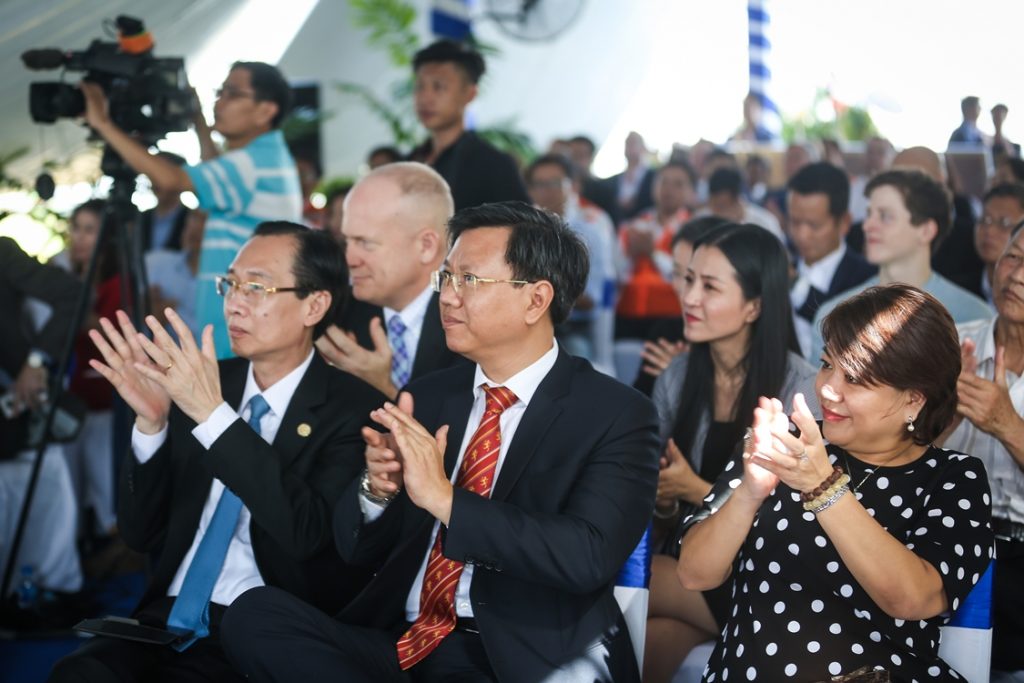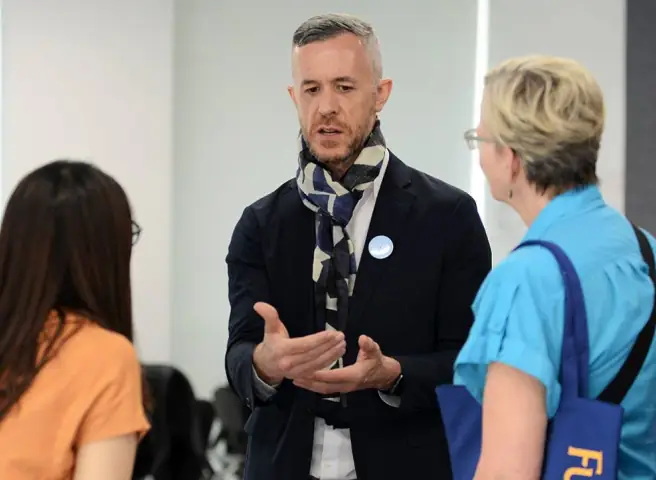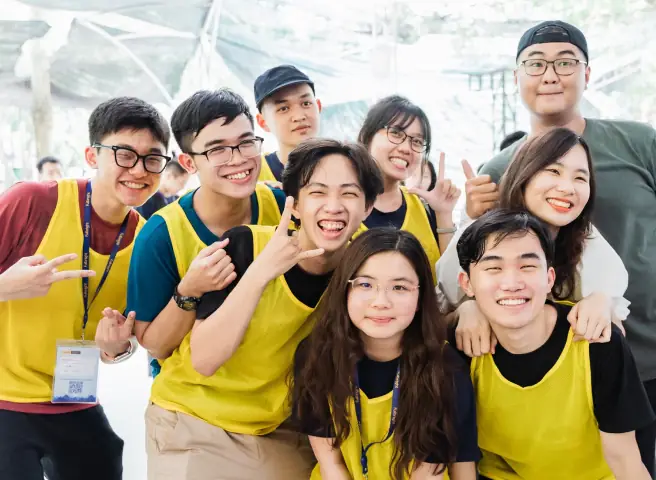
At the Campus groundbreaking ceremony of Fulbright recently, Mr Thomas J. Vallely, new Chairman of Board of Trustee, has addressed key features of Fulbright University Vietnam:
This is the second Fulbright groundbreaking ceremony I have attended in Vietnam. The first was in 1994, almost exactly 25 years ago. On that day we celebrated the construction of the Fulbright Economics Teaching Program’s facility in District 3, about five miles as the crow flies from the Saigon High Tech Park.

Mr Thomas J. Vallely, Chairman of Board of Trustee
Those of you who can remember that far back will recall just how significant that “one room school house”—built with a grant of $175,000 from the U.S.Government was — at that a time, before the US and Vietnam had normalized relations, for an American university, Harvard, to establish a physical presence in Ho Chi Minh City was only possible due to the visionary and courageous efforts of many individuals, a number of whom—including Vo Van Kiet, John McCain, Le Duc Anh, George HW Bush, and Phan Van Khai—are no longer with us.
Like its antecedent, FETP, Fulbright University Vietnam owes its existence today to the unstinting support of a generation of Vietnamese and American leaders: Mr. Nguyen Phu Trong, Mr. Nguyen Xuan Phuc, Dr. Nguyen Thien Nhan, President’s Obama & Trump, Senator Patrick Leahy, and many others.
Fulbright’s transition from ambitious dream to dynamic reality is due to the generous support of both governments. This is symbolized by the land we are standing on today, which as contributed to the university by the city government of Ho Chi Minh City and the national government.
We also benefit from vital financial start-up support from the US Department of State and the US Agency for International Development. We’re honored by the presence this morning of Ambassador Kritenbrink, Consul General Tarnowka, and Craig Hart from USAID.
History demonstrates that the best universities cannot succeed without robust public and private support.
Indeed, the Vietnamese government’s donation of this lovely 15 hectare parcel is reminiscent of the role that grants of land played in spurring the development in the United States of what are today some of the finest universities in the world.

In 1862 the US Congress passed the Morrill Act (named for one of Senator Leahy’s Vermont predecessors, a Vermont Senator) which made public land available for the development of universities. These universities became known as “land grant universities.”
They are the backbone of America’s higher education system, and include the University of California Berkeley, Cornell, Penn State, Texas A&M, and MIT, among many others.
The universities envisioned by the Morrill Act sought to provide, in the words of the legislation “liberal and practical” education to society. During the mid 19th century, this was an innovative—indeed revolutionary—concept at a time when higher education was accessible only to a tiny minority.
Fulbright University Vietnam aspires to be just as revolutionary in our time as the land grant schools were in theirs.

Doing justice to our special opportunity requires that above all else that we not copy models from other times and places, but design a university that is tailored for the challenges and opportunities of the 21st century and to Vietnam’s particular conditions.
So, as much as we admire—and draw inspiration from—the land grant universities and other wonderful institutions of higher learning in the US and around they world, they are not models for us to copy, but examples for us to learn from.
Several features of Fulbright University Vietnam are particularly resonant given this morning’s event here in the Saigon High Tech Park.
First, Fulbright must be embedded in Vietnamese society. This park is such a wonderful location because it will enable us to work collaboratively with our neighbors. These include global leaders like Intel and Samsung and top Vietnamese firms like FTP and VietJet.
Just down the road from us is Vietnam National University, with which we area already cultivating strong ties. In the years to come, Fulbright must prove its value to our neighbors, and to Vietnam more broadly, by ensuring that our teaching, research, and other activities are aligned with the demands and priorities of Vietnamese society.
Second, like the Saigon High Tech Park, Fulbright must embrace technology. Fulbright seeks to prepare its students to live and work in an age defined by technology’s awesome power to impact humanity and the physical world. Fulbright is developing a cutting edge computer science program that prioritizes the frontier of artificial intelligence.
But we believe that technical know-how is not enough. In order to empower students to understand their world both as it is and how it came to be, and also to imagine how it can be requires a liberal education that encompasses the natural and social sciences, the humanities, and the arts. Students must also explore the ethical and moral dimensions of personal and public life.
Universities have a special responsibility to study, preserve, and celebrate cultural heritage. This is a vital role of universities that, I believe, receives insufficient attention here in Vietnam, in the vibrant discourse and debate about higher education that has occurred in Vietnam over the past two decades.
Here I must acknowledge our debt to Mr. Vu Ngoc Hoang, who from the earliest days of the Fulbright University Vietnam project urged us to pioneer new approaches to teaching about Vietnam’s past and the cultural and intellectual roots of contemporary Vietnamese society.

Third, the Saigon High Tech Park is a wonderful example of successful public policy. It exemplifies how society can benefit when the public and private sectors complement, rather than compete, with each other. Here I need to gratefully acknowledge our partnership with the Saigon High Tech Park’s management board.
They have been supportive, patient, and professional colleagues and landlords from the beginning. On behalf of President Thuy and the rest of the university I want to express my thanks to them.
Fulbright University Vietnam believes it can serve Vietnam best by actively participating in and contributing to the continued discourse about Vietnam’s future. This is a critically important dialog. Today in Vietnam it is as vibrant as I can recall in many years.
Two particular initiatives of Fulbright University Vietnam embody our commitment to engagement on the questions that are shaping Vietnam’s future. The first is Fulbright’s public policy program, which will be renamed after Mr. Vo Van Kiet.
Fulbright’s public policy program engages with government at all levels and with other sectors of society in order to understand and solve public problems.
The second is the John McCain Forum. The McCain Forum, our living memorial to Senator John McCain, provides a platform for idea-driven public engagement. Senator McCain believed that vibrant and informed public discussion and debate was vital to democratic society.
The fourth and final feature of the university we are building on this site is the space itself. Simply put, space matters. We now know much more about how people learn than we did at FETP’s groundbreaking in 1994, and exponentially more than when the land grants were built in the 19th century. We need to create community and a campus where teaching, learning, creating, and making takes place 24/7.
The campus that will take shape on these foundations over the next several years will, I believe, embody this commitment to innovation, learning, and service to society.
Once more I want to thank all of you for joining us this morning.







